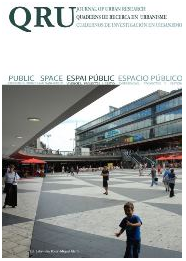Políticas de espacio público en ciudades europeas
DOI:
https://doi.org/10.5821/qru.9547Abstract
This paper is the result of a comparative research on public space policies in nine European cities (Barcelona, Seville, Lyon, Paris, Amsterdam, The Hague, Rotterdam, Berlin and Rome) during the last decades. The research proposes a general overview on the public space renewal processes in each city and it wonders if the policies carried on have led to the emergence of public space cultures. The organisation of the different agents participating in the public space improvements appear as a key factor for the consolidation, spreading and updating of such cultures. Then, the paper analyses the role that different urban devices (public space designs, urban projects, plans and general strategies) have played in the public spaces policies deployed. Finally, the research shows how the public space policies and cultures studied enhanced an urban approach to public space design. Such an approach enables civic places, where it is possible the experience of the collective social framework. The leadership of local administrations and the rich urban heritage in European cities explain that the different processes, autonomous in each city, have all of them converged towards the emergence of urban and civic cultures for public space.Downloads
Issue
Section
License
Those authors who have publications with this journal, accept the following terms:
a. Authors will retain their copyright and guarantee the journal the right of first publication of their work, which will be simultaneously subject to the Creative Commons CC BY-NC-ND-4.0 recognition license that allows third parties to share the work provided that its author and its first publication are indicated in this journal, but they cannot be changed or used commercially.
b. Authors may adopt other non-exclusive license agreements for the distribution of the version of the published work (eg: deposit it in an institutional telematic archive or publish it in a monographic volume) provided that the initial publication in this journal is indicated.
c. Authors are allowed and recommended to disseminate their work through the Internet (e.g. in institutional telematic files or on their website) before and during the submission process, which can lead to interesting exchanges and increase citations. of the published work. (See The effect of open access).













